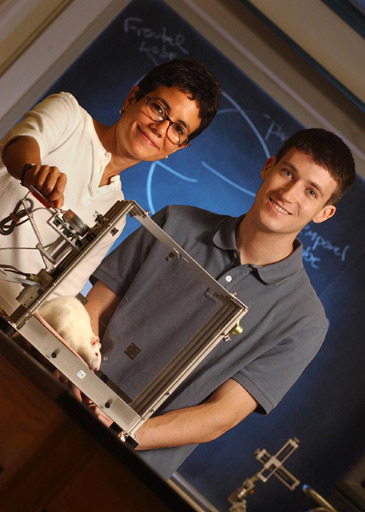Neuroscience major Joshua Brodsky ’03 (Needham, Mass.) is researching Pavlovian eye blink and fear conditioning in rats this summer in an EXCEL Scholars project with Gabrielle Britton, assistant professor of psychology.
Britton has received a grant from the National Institutes of Health to study how the brains of animals react to both threats and “safety signals,” which may give insight into some anxiety-based human disorders.
“The EXCEL work is providing me with skills involved in performing in-depth research, and the opportunity to do hands-on experimentation and data collection,” says Brodsky.
“The research process offers an opportunity to improve his writing, his critical thinking skills, his technical skills, as well as practical skills such as assembling of research equipment,” says Britton. “The process requires flexibility in thinking and an ability to perform a variety of tasks.”
“We will pair a discrete aversive stimulus, such as a foot shock or air puff to the rat’s eye, with an originally neutral stimulus, such as a tone. Furthermore, we will present the rat with safety signals which identify the oncoming of a period during which no aversive stimuli will be presented. Our focus is to determine the specific brain regions involved in forming these associations,” explains Brodsky.
Through surgical procedures, Brodsky will lesion parts of the brain that have been previously implicated in this role, and compare the performance of lesioned rats with that of intact rats. During a physiological psychology course that Brodsky took with Britton in the fall, he executed experiments that required performing surgeries on rats and collecting data through direct behavioral observation. The work he did for that course motivated him to take part in EXCEL this summer.
“Learning the surgical procedures is a challenge in itself. They are very detailed and require special attention and skill, and Josh has become proficient in a very short period of time,” says Britton.
Britton adds that achieving a theoretical understanding of this type of work is a different kind of challenge, one that requires careful reading of the literature and directed discussion.
“Josh and I have only been working together for a few weeks, but we are covering an extensive amount of literature on this topic and spend a great deal of time consolidating the material,” says Britton. “I believe that both aspects of the work, method and theory, are critical for a complete understanding of this type of research, and Josh is well on his way to being able to design and conduct his own independent research project.”
“The fact that individual brain regions are responsible for particular cognitive functions is intriguing to me,” says Brodsky. “I find the current research exciting because it allows me to experience the entire process of how neuroscientists make discoveries regarding these types of functions.”
Britton describes Brodsky as an easy-going and mature young man who demonstrates a natural interest in learning, and says it is a pleasure to work with him.
“It is great that Lafayette gives students the opportunity to work one-on-one with a professor and gain knowledge that may be valuable for their careers,” says Brodsky. “Also, we have great resources for performing this type of work, especially with the relocation of the psychology and neuroscience departments to Oechsle Hall.”
Brodsky is music director of the Chorduroys, Lafayette’s male a cappella group. He is a member of the choir and has been involved in several College Theater productions.

With the goal of gaining insight into human anxiety disorders, Joshua Brodsky ’04, a neuroscience major, studied how rats react to threats and periods of safety in EXCEL Scholars research with Gabrielle Britton, assistant professor of psychology.
